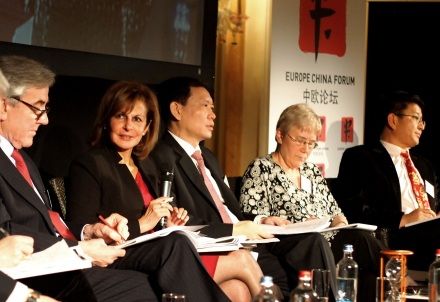
Summary
For months, the European Union (EU) and the world have been riveted to the once-in-a-decade leadership change in China. Though speculation abounds as to whether the new seven-man Standing Committee of the Politburo will be reformers or take a more conservative stance towards governance, “China’s new leaders face old and well-known problems,” noted moderator Shada Islam, Head of Policy at Friends of Europe.
The appointed future President, Xi Jinping, and Premier, Li Keqiang, have demonstrated that they recognize the daunting array of economic and social challenges facing the country and have shown a willingness to tackle them head on, she continued.
They have vowed to fight corruption, narrow the urban-rural income divide and deal with environmental issues. Moreover, the new Chinese leadership must strive to meet the quality of life aspirations of China’s growing and increasingly influential middle class.
Finally, there is much pressure to rebalance China’s economic growth model and change from an export-driven economy to one based on domestic consumption, investment and innovation. “The current model of economic development that has demonstrated impressive growth over the last three decades is no longer valid,” she concluded. “It needs to be transformed.”
About
The rise in China’s global economic and political clout has raised expectations that Beijing will seek a higher profile on the international stage. China’s new leaders, however, are likely to spend more time, energy and money on addressing internal challenges and meeting public expectations. How can the European Union help China to tackle its national economic and social challenges and meet the key concerns of China’s growing middle class?
The debate was followed by an invitation-only dinner organised by the Arenberg Foundation.
Schedule
The rise in China’s global economic and political clout has raised expectations that Beijing will seek a higher profile on the international stage. China’s new leaders, however, are likely to spend more time, energy and money on addressing internal challenges and meeting public expectations. How can the European Union help China to tackle its national economic and social challenges and meet the key concerns of China’s growing middle class? How much pressure is there from the Chinese public as regards quality-of-life improvements such as a cleaner environment, higher food-safety standards, water security, and social protection? Can the EU assist China as it seeks to meet the diverse demands of its “urban billion”- and an ageing population? How difficult will it be for China to undertake the much-needed switch from exports and labour-intensive manufacturing to growth based on domestic demand and innovation? What are the key areas for future cooperation between Europe and China?
Speakers
John Farnell
Principal Adviser in the European Commission Directorate-General for Enterprise and Industry
Viorel Isticioaia Budura
Managing Director for Asia at the European External Action Service (EEAS)
Lina Song
Professor and Chair in Economic Sociology and Chinese Studies at the University of Nottingham
Gudrun Wacker
Asia Senior Fellow, Stiftung Wissenschaft und Politik (SWP), Germany
Zhang Lirong
Secretary-General of the China Forum at Tsinghua University’s Center for International Security and Strategy
Zhang Xinghui
Brussels Bureau Chief for the China Youth Daily
Moderator
Shada Islam
Managing Director at New Horizons Project
Partners
With the support of

Activities
Europe-China Forum 2025
Next event In person & livestreamed

- Area of Expertise
- Global Europe
Trading tariffs and trade as a geopolitical tool
Past event

- Area of Expertise
- Global Europe
From aid to investment: shaping Europe's global role in a changing world
Past event Online

- Area of Expertise
- Global Europe
Future Africa-Europe High-Level Forum
Past event IN PERSON & ONLINE

- Area of Expertise
- Global Europe
Trump's betrayal of the world's poor is Europe's opportunity
- Category
- Frankly Speaking
- Author
- By Giles Merritt
Policy Voices | #Throwback: UNRWA’s Jonathan Fowler on Gaza: “It is a…
- Category
- Podcast
- Area of Expertise
- Global Europe
DRIVE Impact Initiative final report
- Category
- Event Reports
- Area of Expertise
- Global Europe
Europe’s blackouts call for a NATO-level response
- Category
- #CriticalThinking
- Author
- By Maurizio Geri

- Area of Expertise
- Global Europe

- Area of Expertise
- Global Europe

- Area of Expertise
- Global Europe

- Area of Expertise
- Democracy
Continue
the debate on
- Debating Europe
